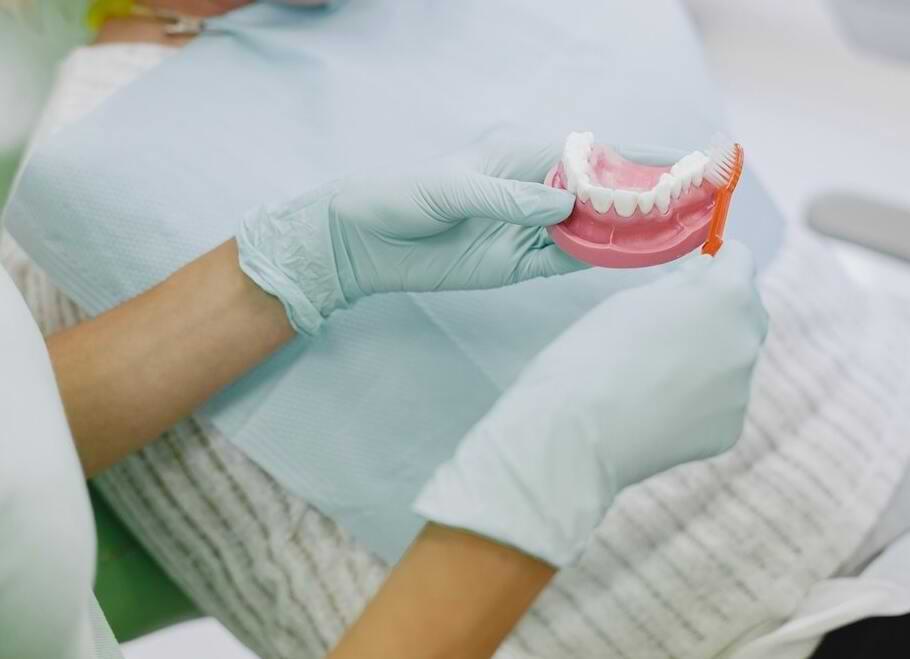
If you’ve been wearing dentures for a while, it’s possible you’ve sustained a little staining. This is the wear and tear that comes part and parcel with teeth ownership, be they artificial or natural.
While a little discolouration is inevitable, the issue arises when the staining becomes unsightly, and you find yourself wondering, ‘how do you get brown stains off of dentures?’. If this is the level you’re at, you’ve stumbled upon the right blog post. We’re about to break into some tips for getting your dentures looking not only stain-free, but also sparkling!
How to Clean Badly Stained False Teeth?
Much like dentures themselves, there’s no one-size-fits-all rule for denture cleaning. Oftentimes, the advice will depend on the type of stain at hand. Of course, the most common advice to avoid dental staining is to abstain from dark beverages like coffee, tea and cola, but this isn’t always practical. We’re all human and we all have our vices.
If you’re at the stage where you’re wondering how to clean badly stained false teeth, chances are you’re seeking ways to undo damage rather than prevent it. So, here are our pointers for removing ‘black and grainèd spots’ that seemingly ‘will not leave their tinct’.
Step 1: Remove & Rinse Your Dentures
Take your removable dentures from your mouth and rinse them beneath running water. This should dislodge any loose food particles or remove liquid residue. Alternatively, you may wish to prepare a sink full of water to ensure you don’t drop and break your dentures as you rinse them.
Pro tip: if you’ve just consumed coffee, it’s best to rinse the removable dentures sooner rather than later. The longer the contact time between coffee and dentures, the more ingrained the stain will become.
Step 2: Brush Your (False) Teeth
Regardless of whether you’re removing stains or not, brushing at least once per day is critical to denture cleaning. You should maintain your dentures as you would natural teeth, with one critical exception: ensure your teeth-cleaning equipment is false-teeth-friendly.
This means you should use a non-abrasive toothpaste, denture paste or denture cleanser in conjunction with a soft-bristled or denture toothbrush.
Step 3: Soak Your Dentures Overnight
Once you’ve taken your removable dentures out at night, you should soak them in a false-teeth-friendly solution. And if you’re wondering, ‘what should I soak my dentures in at night?’, liquids on the whitelist include denture bleach, vinegar and baking soda.
Alternatively, you can apply fast-acting cleansers first before placing your dentures in unadulterated water, but you should ensure to read any instructions on the cleanser’s pack prior to doing so. In the case of partial dentures, you should also double-check that the cleaning solution is partial-safe.
Step 4: Rinse & Repeat Step 1
Before putting your dentures in your mouth in the morning, give them one last thorough rinse with water.
Step 5: Rinse & Repeat Steps 1–4
Repeat all of the above every day until the stains go away.
If you’ve rinsed and repeated the process over many days and you’re still not seeing results, you may require professional dental intervention. In this case, you should book an appointment with your dentist, who should have the medical equipment or resources available to scrub your dentures’ surfaces of stains.
How to Keep Your Dentures Clean?
Whether you want to prevent the above from happening again or are interested in general denture maintenance, here are our top tips for keeping dentures sparkling clean!
1. Brush Your (False) Teeth Morning & Night
Dentists will parrot this advice to anyone who has teeth, regardless of whether they’re natural or artificial: brush your teeth at least twice per day! In the case of dentures, it’s especially important to brush them before bed so they’ll be pristine for their idle time overnight.
2. Brush After Eating
If possible, brush your dentures whenever you eat as this is the best way to remove food particles. At a minimum, strive to do so after consuming staining or sticky foods.
3. Rinse, Rinse, Rinse
On the other hand, brushing after every instance of eating is impractical. Even if it’s all you can muster, a quick rinse between snacks or meals can work wonders and leave you feeling fresher.
4. Use a Denture Cleaner Rather Than Regular Toothpaste
We touched on this earlier, but you’ll need a denture cleaner rather than regular toothpaste. As similar as they may look, dentures and natural teeth do not share the same material, and so you’ll need a specific cleaner that brings out the best and brightest in your denture, as well as takes out the sedimentary nasties.
5. Soak Your Dentures Overnight
If you read this and you’re wondering, ‘what should I soak my dentures in at night?’, water will usually do the trick. Place your dentures in a clear glass so you can stay privy to any spots or sediments you may have missed while brushing. If you’ve sustained some stains or want to keep things a touch fresher, add a denture cleaning solution to the glass.
6. See Your Denture Prosthetist on the Regular
Just as you should see any specialist on the regular, you should visit your denture prosthetist often for professional advice regarding denture maintenance. Advice can vary between full and partial dentures, so it’s best to stay on top of it all with professional insights.
7. Clean Your Mouth Often
Again, this advice applies to everyone, regardless of whether you have natural or artificial teeth: use mouthwash often to kill bacteria, dislodge food particles and remove smells. Ask your denture prosthetists for advice on the best technique to use.
8. Use a Soft-Bristled Toothbrush
While firm or electric toothbrushes work wonders for natural teeth, they’re too abrasive for dentures, which are more fragile—especially if they’re porcelain. Accordingly, you should brush using a soft toothbrush, which will prove adequate in preserving surface shine and texture.
9. Avoid Hot Water
In any other situation, hot water would be the go-to for deep cleaning. In the case of denture cleaning, however, hot water is the enemy that wreaks havoc on the delicate structure of your custom-made dentures. Rather, you should clean your dentures in warm water using a soft brush.
10. Sterilise Your Teeth-Cleaning Tools
As well as cleaning your toothbrush between cleans, you should also sterilise your toothbrush and the glass you keep by the bed. Consider sterilising the areas in which you keep your equipment too, including the locations to which you travel.
How to Store Dentures?
Before we wrap things up, let’s review how to store your dentures. Admittedly, we have largely covered this, but when you’re not storing them in a glass, we recommend storing them in a cool, dry place away from children and pets. You should also keep them away from heat sources as this can deform their custom-made shape. If you’re traveling, it’s best to bring all your equipment with you, but if this isn’t possible, you can also store your dentures in a zip-locked bag. Just ensure to rinse them thoroughly again before use!
Visit Direct Denture Care for All Your Denture Needs
At Direct Denture Care, we are masters of false teeth, but there’s nothing artificial about our customer service. Our expertise in full and partial denture care is expansive and we want to help you get the most out of your acrylic—or porcelain—pearly whites. Give Direct Denture Care a call if you’re overdue for a checkup or if you have any denture-related enquiries. How can we assist you today?











